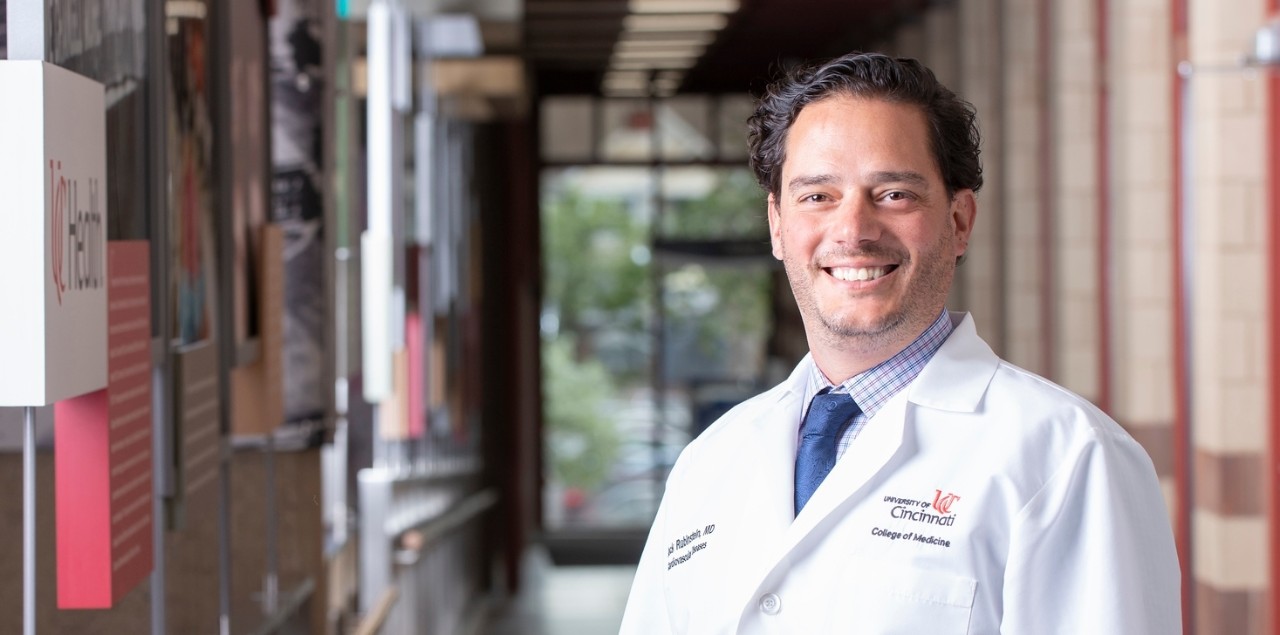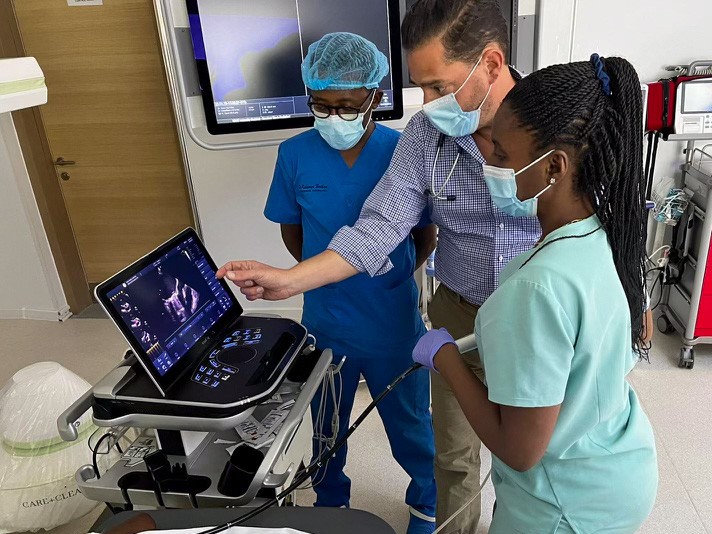
Business Courier: UC researcher pumped about breakthrough for treatment of heart disease
Gout medication discovery emerges as game changer for patients with heart failure
A University of Cincinnati researcher made a groundbreaking discovery that has the potential to revolutionize the treatment of heart failure, as reported by the Cincinnati Business Courier.
Jack Rubinstein, MD, is the chief medical officer launching TRPV Pharmaceuticals, a company dedicated to advancing a therapeutic approach for cardiovascular disease.
Rubinstein is also a UC professor of internal medicine at the UC College of Medicine and a pioneering researcher in the field of cardiovascular diseases.
Through more than a decade of intense research, Rubinstein uncovered a remarkable revelation:
- An FDA-approved medication initially designed for gout management known as probenecid could be repurposed to significantly improve the lives of heart patients grappling with decreased cardiac output or weakened heart contractability, a condition known as heart failure.
Rubinstein shared circumstances under which the heart muscle can fail to pump blood effectively, leading to inadequate circulation.
Partnering with Fred Sexton, a seasoned entrepreneurial pharmaceutical industry executive with experience developing successful startups, the two co-founded TRPV Pharmaceuticals.
Sexton serves as CEO of TRPV Pharmaceuticals and said, “The company's launch centers around advancing treatments based on transient receptor potential vanilloid (TRPV) channel agonists, with its primary focus on probenecid, the substance found in gout medication and the active ingredient in the drug we are currently developing.”
Safety is our No. 1 concern. The drug we are developing aims to improve the way the heart pumps, increase patient survival and enhance overall well-being.
Jack Rubinstein, MD Chief medical officer of TRPV Pharmaceuticals, UC researcher and professor of internal medicine, UC College of Medicine
The products under development at TRPV Pharma will include multiple dosage forms of probenecid to be used during episodes of acute decompensated heart failure.
“So, our whole approach to developing this molecule for commercial purposes is to better serve patients with an acute event of congestive heart failure. When we look more holistically, anything that we can do to help the patient at that point is critically important,” Rubinstein said. “Stabilizing them sooner reduces the individual cost for that patient, and they return home with an oral version to help sustain improved heart contractility.”
Rubinstein said the four existing "pharmacologic pillars" for managing heart failure in patients address different aspects of heart failure, however, none of these enhances contractility.
“Safety is our No. 1 concern,” Rubinstein said. “The drug we are developing aims to improve the way the heart pumps, increase patient survival and enhance overall well-being. Anticipating no adverse effects on cardiac health, our drug promises to be a safe treatment option. We see it as a potential ‘fifth pillar’ to complimenting the existing pharmacologic approaches."

Jack Rubinstein, MD, chief medical officer of TRPV Pharmaceuticals, UC researcher and professor of internal medicine at the UC College of Medicine. Photo/Andrew Higley/UC Marketing + Brand
According to the AHA, over 6 million Americans currently struggle with heart failure, with over 1 million new cases diagnosed annually in adults aged 55 and older.
The TRPV channel family that the Rubinstein laboratory is targeting, was first identified in 1997 by David Julius, PhD. His groundbreaking work with capsaicin compounds and the body's receptors earned him the Nobel Prize in 2021 for TRPV1. Rubinstein has dedicated nearly two decades of study related to cardiovascular disease and has been focusing on the TRPV2 variant of this channel for over a decade.
“So, we’re in good company working with Nobel Prize laureates as we develop a derivative of probenecid for heart patients,” Sexton said. “This breakthrough discovery not only offers hope for improved cardiovascular treatments but also holds the potential to become the prescribed standard of care to save countless lives.”
TRPV Pharmaceuticals is raising its A-Round funding to support ongoing studies and the development of TRPV2 intravenous formulation and oral solid of the drug, probenecid.
The next phase typical in biopharmaceutical product development involves conducting clinical trials tailored to validate efficacy within the cardiovascular domain, focusing mainly on acute-to-compensated heart failure or heart failure with reduced ejection fraction.
Geoffrey Pinski, assistant vice president of Technology Transfer located within the UC 1819 Innovation Hub said, “We solidified intellectual property protection and now the licensing enables the development of this future treatment.”
Pinski and his team’s successful acquisition of patents in the United States and other significant global economic regions represents a pivotal advancement toward the commercialization and realization of this promising treatment.
Featured image at top: Jack Rubinstein, MD, UC professor of internal medicine, UC College of Medicine. Photo/Andrew Higley/UC Marketing + Brand
Innovation Lives Here
The University of Cincinnati is leading public urban universities into a new era of innovation and impact. Our faculty, staff and students are saving lives, changing outcomes and bending the future in our city's direction. Next Lives Here.Replace with your text
Related Stories
Cincinnati researchers want to know if MRIs can work better
June 28, 2024
WVXU and the Cincinnati Business Courier highlighted a new collaboration between the University of Cincinnati College of Medicine, UC Health GE HealthCare, JobsOhio, REDI Cincinnati and Cincinnati Children’s to create an MRI Research and Development Center of Excellence located on UC’s medical campus.
UC 1819 Innovation Hub workshop spreads AI awareness
June 28, 2024
Microsoft and Disrupt Now joined forces to run a June 24-27 seminar at UC’s 1819 Innovation Hub teaching Cincinnati residents how to responsibly use AI.
UC opens Blood Cancer Healing Center
June 28, 2024
Media outlets including WLWT, Local 12, Spectrum News, the Cincinnati Enquirer and Cleveland.com highlighted the opening of the University of Cincinnati Cancer Center's Blood Cancer Healing Center.
Financial factors to consider when moving
June 27, 2024
Moving can be a stressful and expensive endeavor. When it comes time to move, there are important financial implications to consider, Gary Painter, PhD, the academic director of the University of Cincinnati’s Carl H. Lindner College of Business real estate program and a professor of real estate, told USA Today.
New project aims to better support teen mothers in Adams County
June 27, 2024
WCPO highlighted a partnership between the University of Cincinnati and the Adams County Health Department that is aiming to provide better support for teen mothers in the county.
Free Wi-Fi, work area coming to Greater Cincinnati
June 27, 2024
St. Lawrence Park in Price Hill now has free Wi-Fi and a furnished outdoor space for community members to access digital needs. The space is part of The Nodes Project, which stands for “Neighborhoods of Design Engagement": a collaboration between UC DAAP communication designers and community entities.
Study aimed at reducing opioid overdose deaths presents results
June 27, 2024
The University of Cincinnati's John Winhusen and Caroline Freiermuth discussed the evidence-based practices implemented during the HEALing Communities Study to fight the opioid epidemic with Spectrum News.
University of Cincinnati, UC Health collaborate with GE HealthCare on MRI research center
June 26, 2024
The University of Cincinnati and UC Health are collaborating with GE HealthCare, JobsOhio, REDI Cincinnati and Cincinnati Children’s to create an MRI Research and Development Center of Excellence located on UC’s medical campus.
UC grad’s innovative tech to manage ER wait times
June 25, 2024
When launching Teravus, a health care triage management startup, Jason Murray turned to the University of Cincinnati's Center for Entrepreneurship and the 1819 Venture Lab for guidance and funding.
The health impact of living near a natural gas leak
June 25, 2024
UC College of Arts and Sciences Professor Amy Townsend-Small talks to the BBC about the health issues faced by neighbors of leaking natural gas wells.
